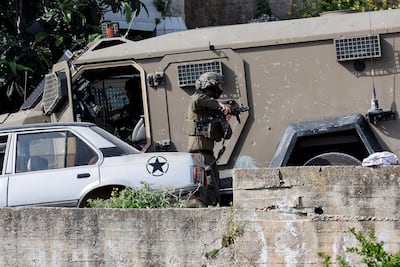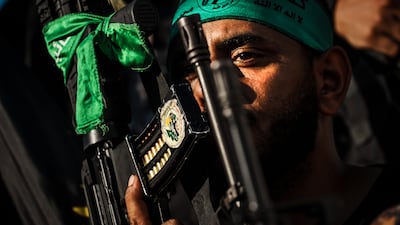Last summer in Gaza was an unforgettable one. After 17 years under Hamas control, and 17 years of Israel blockading the Strip, the mood was slightly upbeat. Thanks to Qatar’s financial support and Israel loosening its permit system for Gazans to work in Israel, the economy was improving gradually. My friends and family were out almost every night, at weddings, restaurants, concerts and family picnics on the Mediterranean.
The silent majority – the many Palestinians in Gaza who support neither Hamas nor its rival Fatah, and who gritted their teeth through the blockade – felt a sense of hope that had long been missing. In years past, many in Gaza felt that Hamas only helped its own, an observation rarely made in public. Historically, the group has not taken criticism well. But last summer, the economy was improving for everyone, and the silent majority could see a life under its rule.
Now, with much of Gaza in ruins, last summer feels like a distant memory. Those who were warming up to Hamas are turning against them due to Israel’s nearly six-month-long war. They have lost their homes and their loved ones, and they are living a life of constant terror and dehumanisation.
Yet just as Gazans are becoming loudly critical of Hamas, the group appears to be gaining momentum like never before among Palestinians in the West Bank and those in exile – that is, those who never lived under its rule. After years of defanging Hamas’s political opponents, Israel is ramping up Gaza’s destruction and acting with unprecedented aggression in the West Bank. So long as it continues, it won’t matter that Hamas is losing its foothold in Gaza: for the rest of Palestine, Israel’s actions are only bringing the group even more popularity.

I was born and raised in Gaza. I spent 14 years working there as a reporter and analyst, including for The New York Times for nine years. I’ve stayed in touch with many sources there from my home in the Netherlands. In recent weeks, these sources have told me about their anger at the calamity that Hamas has brought on them. They all spoke to me on condition of anonymity out of fear for their safety; some of them are identified by their first names.
Ahmed, a 32-year-old from a well-to-do neighbourhood called Rimal, managed to leave Gaza after 70 days of war. He took out a mortgage to buy a beautiful apartment with a view of the Mediterranean; it was destroyed by an Israeli air strike on October 7, forcing him to flee with his wife and two-year-old son, with nothing but the clothes on their backs.
Ahmed is furious with Hamas for what he sees as a miscalculated attack. “Whoever made the decision to attack on October 7 was immature,” he told me. “Why is it always the Gazans who sacrifice for Palestine?” He will pay his pointless mortgage on his destroyed apartment for 10 more years. “Why buy a new [house] once this is over if it can all go away?” he asked me.
During the brief pause in fighting in November, many in Gaza hoped that a permanent ceasefire could be reached. Instead, Hamas released Israeli hostages in exchange for the release of Palestinian prisoners held in the West Bank, a world away from those in Gaza who are living through constant bombardment.
One man, whose wife was killed by an air strike on the Nusairat refugee camp where he lived, told me he couldn’t understand how prisoners in the West Bank could somehow be worth the death of his loved one. How could he celebrate their release?
A 56-year-old woman, who had been displaced for the fifth time, told me that she was living in an apartment in Rafah with her children and three other families. Terrified of being killed in an air strike, thirty of them share one bathroom and struggle to get food and water. They arrived in Rafah desperate to cross into Egypt but haven’t been able to so far. An outspoken Hamas supporter before the war, the woman was furious that the group used the ceasefire to exchange prisoners in the West Bank. “We don’t want prisoners released,” she told me. “We want an end to the war! When will this stop?”
But while Hamas is losing popularity in Gaza, even among its former supporters, it is winning over another group: the 3.5 million Palestinians living in the West Bank and East Jerusalem.
A recent opinion poll shows that support for the group has more than tripled in the West Bank since the conflict began. For them, Hamas has succeeded in bringing Israel’s long occupation back on the global radar, something their current representatives, the Palestinian Authority, have failed to accomplish. Before October 7, Israel had weakened the PA by moving to establish ties with Saudi Arabia without a meaningful change in its policies towards Palestinians. The blockade and the expansion of Israeli settlements had become the norm, and Israel had rejected any negotiation with the PA aimed at a Palestinian sovereign state.
Now, the October 7 attacks and the subsequent war on Gaza have put the Palestinian cause back in the global spotlight. Moreover, Israeli forces have conducted regular raids across the West Bank, arresting hundreds of Palestinians and killing dozens. It’s the worst violence the territory has experienced in years – and it’s driving support for Hamas.
A Christian Palestinian acquaintance, who is a Fatah supporter, posted his condolences for the assassinated Hamas leader Saleh Al Arouri on social media, calling him a martyr. Even for moderates in the West Bank, vocal criticism of Hamas has become taboo: after Hussein Al Sheikh, a top PA official, condemned Hamas’s miscalculation in an interview, he had to clarify his remarks due to criticism from his own constituents.
Palestinians in exile are also looking to Hamas for hope as never before – for political ends that don’t reflect their governance problems.
One woman in Amman told me she waits with bated breath for updates from Hamas’s spokesman Abu Obayda who has become the voice of the group throughout this war. He posts dispatches online from an unknown location. “We breathe a sigh of relief when one of his videos is released,” she told me. “It means that the resistance is still holding strong. Abu Obayda has given my son an education on Palestine overnight.”
As a Gazan, and an observer of Palestinian politics, it’s painful to watch this cycle continue. Over the past 17 years, I have seen Israeli policies indirectly help Hamas gain popularity. During the Second Intifada, for instance, Israel killed those Hamas leaders who had accepted the two-state framework and had been from poor and working-class neighbourhoods. And as the Israeli military killed civilians almost every day, many Palestinians saw Hamas as victims, too.
Gaza, however, is facing unprecedented levels of death and destruction today. I struggle to find words to describe the scale of it. I have seen the territory survive several wars, but it has never been as it is now. Entire neighbourhoods – the same ones where families enjoyed their summer nights last year – have been reduced to rubble, and every single person who hasn’t been killed knows many who have.
Of the dozens of calls I’ve made to my sources in Gaza, not a single one can envision the reconstruction of their homes after this war.
It’s ironic, then, that the war is resulting, at least for now, in the widespread rejection of Hamas in Gaza, even as the rest of Palestine – including the millions watching the painful images from afar – is increasingly supporting the group. In other words, Israel’s policy of eradicating Hamas is – once again – not working.











